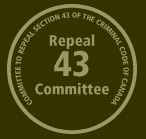![]()
International Spank Out Day - April 30th
Mark your calendar
International SpankOut Day was initiated in 1998 by EPOCH-USA to bring widespread attention to the need to end physical punishment of children and to provide educational information to parents and caregivers about non-violent alternatives. Over 500 informational events and programmes have been held in the US and in other countries where it is sometimes called "no hitting day", "no smacking day" or "day of non-violence for children".
The Canadian Children's Rights Council would like to have 365 "SpankOut Days" each year.
Spanking Doesn't Work - Learn to parent
Spanking is not an effective form of discipline, even though some people may think it is.
Spanking can lead to anger and resentment and can cause children to lose trust in their parents.
Spanking teaches that hitting others is okay. In the long run, spanking makes children's behaviour worse, not better.
What Does Work?
What works is to build your child's confidence and problem-solving skills. It is important to figure out the reasons for your child's behaviour such as:
boredom tiredness hunger
frustration restlessness
lack of words for feelings
misunderstanding
discouragement fear
illness
physical pain
sudden interruption of an activity.
Toddlers Want to Touch Everything
It's how they get to know the world. Slapping a child's hand teaches the child to fear his or her world, not to explore and understand it. The use of time-out is not appropriate for children under two.
Things to try: Put dangerous things out of reach
shift your child's attention with a safe toy
use words like "hot," "sharp," "ouch" to teach about danger
watch your child closely
always make sure your child is in a safe place where you can see him or her.
Is Your Pre-schooler having Tantrums?
Often, young children have tantrums because they are frustrated and cannot control their feelings. They can be frightened by their tantrums. Spanking them may only frighten them more
Things to try: Stay close by keep your child safe stay calm and quiet take deep breaths. When he or she is calm, use words like "You were mad." Show your child how to handle angry feeings without yelling or hitting
Ways to Celebrate International Spank Out Day in Your Community
You can do this!
- Host a Spank Out Day special event.
Take a look at what organizations did in 2006 in the
U.S.A. You can do this with your neighbours, at
your temple, church, synagogue....you get the idea.
- Distribute literature promoting the stop spanking theme to everyone you know personally and to organizations to which you belong. The free Health Canada publication "What's wrong with Spanking? - PDF file" can be download from this website site in pdf format (800kb). Print it off and give it out at work. Ask your employer to distribute a copy to every employee. Note the "Parent Help Line" listed in the brochure is no longer in service.
- Email everyone you know. Cut and Paste the
following in your email:
email subject: It's International Spank Out Day - April 30th. Hitting kids is wrong!
email body:
_________
Hitting kids is wrong! I support International Spank Out Day!
I support the repeal of section 43 of the Criminal Code of Canada which still allows corporal punishment of Canadian children. You can read about the Supreme Court of Canada corporal punishment decision at: Supreme Court of Canada - Corporal Punishment of Children
Please read the free Health Canada publication "What's wrong with Spanking? - Pdf file (800kb)" which can be download from the website of the Canadian Children's Rights Council at www.CanadianCRC.com
Please send this email to everyone you know and spread the word!
_________
- Read the Canadian Children's Rights Council
position paper on effective child discipline
- Submit a public service announcement or press release to
local media. Just look up your community's newspaper,
radio or television addresses in the phone book or on
the internet; fill in the blanks on our sample materials;
and mail or e-mail them.
- Submit a newsletter article or copies of the article below
"to your civic group, school or church.
- Write to your MP or the Prime Minister of Canada about banning corporal
punishment in the Criminal Code of Canada.
- Have your mayor, city council or premier sign a
proclamation announcing SpankOut Day in your city,
territory or province. Fill in the blanks on our
Sample letter
- Send your letters to the Prime Minister of Canada and every member of the House of Commons and the Senate of Canada. Remember you can send letters to MPs and Senators free, no postage required.
- Talk to your relatives, friends, neighbours and co-workers about using positive, non-violent ways to teach and discipline children. How to Talk about Spanking
- Have your mayor, city council or governor sign a proclamation announcing SpankOut Day in your city or state. Fill in the blanks on our Proclamation Request Letter Sample
- Get your town / city council to adopt a resolution calling for a Spank-Free town.
- Here are some ideas for activities in faith communities.
- Talk to your relatives, friends, neighbours and co-workers about using positive, non-violent ways to teach and discipline children.
- Talk to your relatives, friends, neighbours and co-workers about using positive, non-violent ways to teach and discipline children.
- Talk to your relatives, friends, neighbours and co-workers about using positive, non-violent ways to teach and discipline children. a group you belong to write a letter to the Repeal 43 Committee endorsing the position of the Repeal43 Committee , the committee to repeal section 43 of the Criminal Code of Canada which allows assaulting children to discipline them ( see the right sidebar for the Repeal 43 Committee).
- Talk to your relatives, friends, neighbours and co-workers about using positive, non-violent ways to teach and discipline children.
- Read our web pages about the decision of the Supreme Court of Canada who decided to continue to allow assaulting children to discipline them Read More ...
Scholarly Submission to the Canadian Children's Rights Council
University Paper
The Issue of Corporal Punishment
By Stacey McDonald, student, Cape Breton University, November 25th, 2005
The purpose of this paper is to examine the question of whether the practice of corporal punishment in law should be made illegal in Canada. The question is this: in light of the UN Convention on the Rights of the Child, should Canada take steps to make the physical punishment of children even light spanking against the law. Corporal punishment is described in Katherine Covell & R. Brian Howes book, The Challenge of Children's Rights for Canada as any form of physical behaviour used to discipline a child that is not severe enough to be classified as abuse(70). Corporal punishment, or spanking, is problematic because people have different versions of light spanking; there is no universal code or form of light spanking. What one considers light spanking, another may consider extremely harsh. Read More ..
Make up an Event Announcement
EVENT ANNOUNCEMENT (You may want to submit the Canadian Children's Rights Council International Spank Out Day Press Release with this announcement).
Local Contact: [Your name, organization, phone, email]
National Contact: The Canadian Children's Rights Council - Toronto, ON 416-268-5448 -
WHAT: To celebrate International Spank Out Day in [name of your community], [name of your organization] is hosting [name of your event]. [Brief description of your event].
WHERE: [event location, address]
WHEN: [date and time]
WHO: [who is invited...the target audience for your event]
WHY: International Spank Out Day was initiated in 1998 to give widespread attention to the need to end corporal punishment of children and to promote non-violent ways of teaching children appropriate behaviour.
FOR INFO: Call [name of your organization] at [your phone] or visit [your web site]
Global Initiative to End All Corporal Punishment of Children
London, England
This site tracks and summarizes major world developments in ending legal support for corporal punishment in the home and school. It was launched in 2001 and is endorsed by UNICEF and UNESCO.
SPANK OUT DAY - USA EVENTS AND PROGRAMS

The Center for Effective Discipline - U.S.A.
Read all about what's happening for International Spank Out Day in the U.S.A.
155 W. Main Street, #1603
Columbus, OH 43215
Tel: 614 221 8829
Email: info@stophitting.org
Website: www.stophitting.org



